Taiping rebellion Study guides, Class notes & Summaries
Looking for the best study guides, study notes and summaries about Taiping rebellion? On this page you'll find 33 study documents about Taiping rebellion.
Page 3 out of 33 results
Sort by
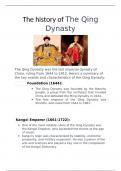
-
The Rise and Fall of the Qing Dynasty: A Historical Overview
- Summary • 3 pages • 2023
-
Available in package deal
-
- $8.17
- + learn more
The summary outlines the major events and characteristics of the Qing Dynasty, the last imperial dynasty in China that ruled from 1644 to 1912. The summary covers key emperors such as Shunzhi, Kangxi, Yongzheng, and Qianlong, highlighting their contributions and the stability and prosperity during their reigns. It also addresses significant historical events like the Opium Wars, Taiping Rebellion, Self-Strengthening Movement, Sino-Japanese War, Boxer Rebellion, and the Xinhai Revolution, which ...
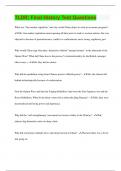
-
TLDR; Final History Test Questions | Questions with 100% Correct Answers | Updated & Verified
- Exam (elaborations) • 5 pages • 2023
-
- $7.99
- + learn more
What was "free market capitalism" and why would China object to such an economic program? - tldr; free market capitalism meant opening all their ports to trade w western nations. this was objected to because of pretentiousness, conflict w confucianism, and a strong, regulatory govt Why would China sign what they- themselves labeled "unequal treaties" in the aftermath of the Opium Wars? What did China lose in the process? (extraterritoriality for the British, amongst other issues.) - tld...
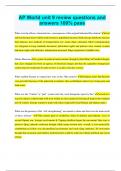
-
AP World unit 9 review questions and answers 100% pass
- Exam (elaborations) • 4 pages • 2024
-
- $7.99
- + learn more
What were the effects, characteristics, consequences of the original Industrial Revolution? coal and iron became more widely used resources. population increase (birth rate up, death rate increase then plateau). new methods of transportation (ex: steam ships, railroads). More communication (ex: telegram) Living standards decreased. job/worker rights and policies were created. women had more rights and influence. urbanization increased. Huge expansion of middle class. Define Marxism a system...
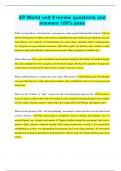
-
AP World unit 9 review questions and answers 100% pass
- Exam (elaborations) • 4 pages • 2023
-
- $9.29
- + learn more
What were the effects, characteristics, consequences of the original Industrial Revolution? coal and iron became more widely used resources. population increase (birth rate up, death rate increase then plateau). new methods of transportation (ex: steam ships, railroads). More communication (ex: telegram) Living standards decreased. job/worker rights and policies were created. women had more rights and influence. urbanization increased. Huge expansion of middle class. Define Marxism a system...
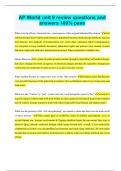
-
AP World unit 9 review questions and answers 100% pass
- Exam (elaborations) • 4 pages • 2023
-
- $7.99
- + learn more
What were the effects, characteristics, consequences of the original Industrial Revolution? coal and iron became more widely used resources. population increase (birth rate up, death rate increase then plateau). new methods of transportation (ex: steam ships, railroads). More communication (ex: telegram) Living standards decreased. job/worker rights and policies were created. women had more rights and influence. urbanization increased. Huge expansion of middle class. Define Marxism a system...
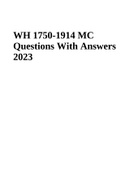
-
WH 1750-1914 MC Questions With Answers 2023
- Exam (elaborations) • 59 pages • 2023
-
- $17.49
- + learn more
WH 1750-1914 MC Questions With Answers 2023. The American and French Revolutions were both caused in part by a. food shortages owing to poor harvests. c. high taxation that bred discontent. b. problems of royal succession. d. lack of social mobility in the peasant class. ANS: C Kaplan 2016 6. Which of the following statements is true regarding the growth of nationalism in the 19th century? a. War and conflict were often used as vehicles to unite the people. b. The transition to nationho...
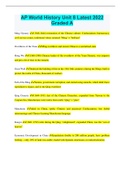
-
AP World History Unit 8 Latest 2022 Graded A
- Exam (elaborations) • 11 pages • 2022
-
- $9.49
- + learn more
AP World History Unit 8 Latest 2022 Graded A Ming Dynasty (1368-1644) restoration of the Chinese culture: Confucianism, bureaucracy, civil service exams, traditional values returned "Ming" = "brilliant" Overthrow of the Yuan Ming overthrow and restore China to a centralized state Hong Wu (1368-1398) Chinese leader of the overthrow of the Yuan Dynasty, was emperor and put a lot of trust in the eunuchs Great Wall finalized the building of this in the 15th-16th centuries (during the Ming), b...
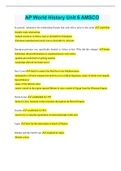
-
AP World History Unit 6 AMSCO
- Exam (elaborations) • 7 pages • 2022
-
- $9.49
- + learn more
AP World History Unit 6 AMSCO In general, summarize the relationship Europe had with Africa prior to this point -somewhat friendly trade relationship -natural resources in Africa seen as desirable by Europeans -European manufactured goods seen as desirable by Africans European presence was specifically limited in Africa at first. Why did this change? -better technology allowed Europeans to expand presence w/in Africa -quinine prevented risk of getting malaria -steamship allowed for better trave...
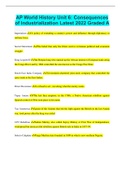
-
AP World History Unit 6: Consequences of Industrialization Latest 2022 Graded A
- Exam (elaborations) • 6 pages • 2022
-
- $10.49
- + learn more
AP World History Unit 6: Consequences of Industrialization Latest 2022 Graded A Imperialism A policy of extending a country's power and influence through diplomacy or military force. Social Darwinism The belief that only the fittest survive in human political and economic struggle. King Leopold II the Belgian king who opened up the African interior to European trade along the Congo River and by 1884 controlled the area known as the Congo Free State. Dutch East India Company Government-charte...
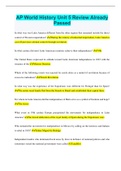
-
AP World History Unit 5 Review Already Passed
- Exam (elaborations) • 4 pages • 2022
-
- $9.49
- + learn more
AP World History Unit 5 Review Already Passed In what way was Latin America different from the other regions that remained outside the direct control of Western imperialism? During the century of industrial imperialism, Latin America cast off previous colonial controls through revolution. In what century did most Latin American countries achieve their independence? 19th The United States expressed its attitude toward Latin American independence in 1823 with the issuance of the Monroe Doctrine...



